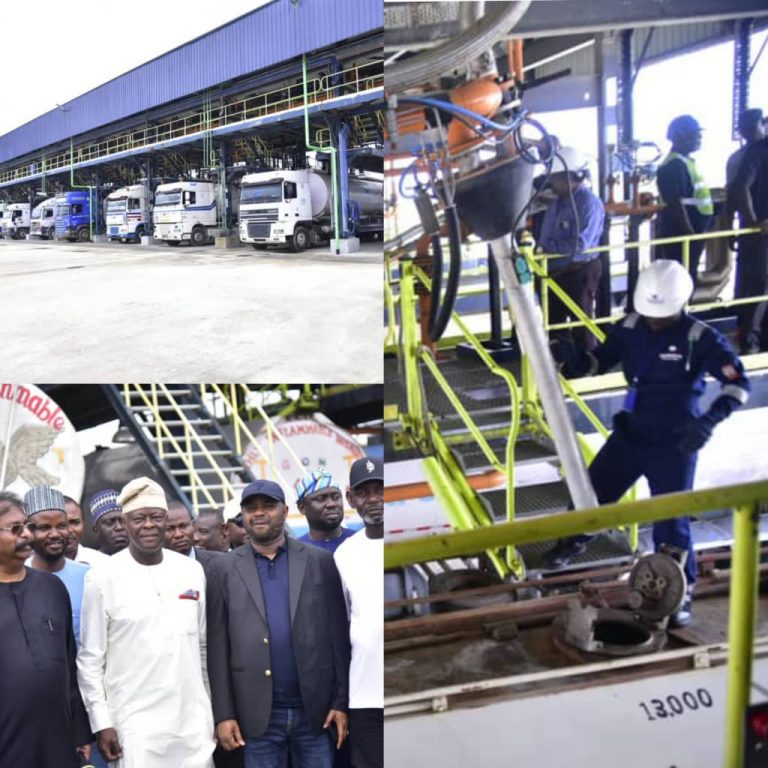
The Dangote Petroleum Refinery and the Nigerian National Petroleum Company Limited gave divergent views over the price of Premium Motor Spirit, popularly called petrol, produced and pumped out on Sunday by Dangote Refinery.
While both oil firms have different accounts of the price of PMS dispensed by Dangote on Sunday, independent oil marketers say they are still awaiting the price of the commodity from the sole off-taker of the product – NNPC.
This came as the major oil marketers told one of our correspondents that they got PMS from NNPC at the rate of N766/litre, while NNPC said it bought the product from Dangote at N898/litre.
NNPC also said it was to load 16.8 million litres of petrol from the Dangote refinery on Sunday, in contrast to the 25 million litres that the refinery had announced earlier it would release to the national oil company on a daily basis.
The spokesperson of NNPC, Olufemi Soneye, confirmed that over 70 trucks of PMS departed the Dangote refinery on Sunday, which was the first day for the release of petrol from the plant to the domestic market.It was also gathered from the national oil company that over 48 million litres of crude oil had been supplied and scheduled for supply to the $20bn Lekki-based refinery by NNPC from December 2023 to October 2024.
NNPC officially commenced the loading of petrol from the 650,000 barrels per day capacity Dangote Petroleum Refinery on Sunday.
In a WhatsApp message to one of our correspondents confirming this and providing insight on the cost of the petrol from the Lagos-based refinery, Soneye said, “We successfully loaded PMS today (Sunday) at the Dangote refinery.
“The report stating that we (NNPC) purchased it at N1,300/litre is false. For this initial loading, the price was N898/litre. I can also confirm that we will receive 16.8 million litres. As of now, we have loaded over 70 trucks.”
However, Dangote refinery denied the price with Anthony Chiejina, Dangote Group’s Chief Branding and Communications Officer, labelling the claim as “misleading and mischievous,” stating that it undermined the company’s recent milestone in addressing Nigeria’s long-standing energy crisis.
According to Chiejina, the statement from NNPC was aimed at derailing the progress achieved towards alleviating energy insufficiency and insecurity, which had plagued the country for decades.
In a statement on Sunday, the Dangote official said, “Our attention has been drawn to a statement attributed to NNPC spokesperson, Mr Olufemi Soneye, that we sell our PMS at N898/litre to the NNPC.
“This statement is both misleading and mischievous, deliberately aimed at undermining the milestone achievement recorded today, September 15, 2024, towards addressing energy insufficiency and insecurity, which has bedevilled the economy in the past 50 years.
“We urge Nigerians to disregard this malicious statement and await a formal announcement on the pricing, by the Technical Sub-Committee on Naira-based crude sales to local refineries, appointed by His Excellency, President Bola Tinubu GCFR, which will commence on October 1, 2024, bearing in mind that our current stock of crude was procured in dollars.”
Chiejina further clarified that the current stock of crude sold to NNPC was procured in dollars, with significant savings compared to existing import prices.
“With this action, there will be petrol in every Local Government Area of the country regardless of their remote nature.
“We assure Nigerians of the availability of quality petroleum products and putting an end to the endemic fuel scarcity in the country,” the statement added.
Marketers await price
President of the Independent Petroleum Marketers Association of Nigeria, Abubakar Maigandi, said IPMAN members had yet to receive the price of the product from NNPC, the sole off-taker of petrol from Dangote.
“We are hearing of different prices, but we have not heard from NNPC directly on the amount that they would want to sell the product to us. Remember that NNPC is the sole off-taker of the petrol from Dangote refinery. So, we are still waiting to hear from them.”
But a major oil marketer said they got petrol from NNPC at N766/litre, stressing that some major PMS dealers would start loading the product allocated to them by NNPC from Dangote refinery beginning from Monday.
“When NNPC gives marketers allocation, they (marketers) will simply go to Dangote to pick up. The payment will be to NNPC, while NNPC in turn pays to Dangote,” the source, who spoke on condition of anonymity because he was not authorised to speak on the matter, stated.
The official added, “NNPC sells to marketers at N766/litre, NNPC buys from Dangote at N898/litre. Marketers are supposed to mobilise their trucks to Dangote, pick up products, and then take them to their stations. The cost of transporting, fees, and other logistics will be borne by the marketers.”
It was gathered that the major marketers involved in this arrangement include Conoil, NIPCO, Total, Mobil, Oando (NNPC Retail), Adova and Depots and Petroleum Products Marketers Association of Nigeria members.
The Executive Vice President of Downstream at NNPC, Dapo Segun, in a video shared to one of our correspondents on Sunday by the media department of the company, said the cost of petrol would be determined by market forces.
“NNPC is not a regulator. NNPC has no regulatory powers. We can’t say NNPC sets the price. The government is not involved. It is the market forces that set the price. So, Dangote says to us, ‘this is how much I want for it,’ and we say, ‘hey Dangote, if we go out there we can get it for this much. So, we won’t pay you this much for it.’ And we got into the negotiations, which took over a week. They come with their position, we come with a counter; they come with their revised position and we will counter it. And at the end of the day, we were able to reach an agreement on the price to pay for it,” he said.
On crude sale to Dangote, he said, “Payment will be done in naira. So, when the refinery buys a barrel of crude for $80, it is still $80. When the payment is due, it will be converted on that due date to naira and it will be paid in naira.The marketer, of which NNPC is one, goes to the refinery to buy the product in bulk in dollars, when that payment is due, instead of NNPC going to the market to chase dollars, NNPC pays for that product in naira. So, that is what it is. It is a simple payment solution, no more, no less.”
Fuel scarcity
Speaking with journalists at the loading point on Sunday in Lagos, the Vice President of Dangote Industries Limited, Devakumar Edwin, stated that the latest development would resolve the fuel scarcity debacle that had repeatedly affected the country for 52 years. He noted that the refinery’s production capacity was extensive, adding that it could fulfil all of Nigeria’s needs and still have a substantial surplus for export.
He said, “Well, to quote my president, 52 years the country has been talking about resolving the problem of PMS and now we can produce PMS with a facility within Nigeria.
“The production capacity is so large that we can meet all the requirements of Nigeria and we have a huge surplus to export. So, this is a huge moment of pride for every Nigerian because this is a Nigerian-owned refinery built by a Nigerian and now producing PMS for Nigeria.”
He added that at full capacity, the refinery would load 290 tankers per day.“In the next hour, you would see 30 more trucks lined up, and 40 tankers would be loaded simultaneously. An actual truck loading time is 40 minutes, which means we can load 290 a day of various products. This refinery is the biggest you can see anywhere else.
“We sell at our ex-factory, and it is for the buyers to plan and weigh means of evacuating by pipeline. Some contractors have to meet us if they want to build pipelines. NNPCL can also do that too. We sell at a factory, and anyone who wants to connect by pipeline can do so.
“Initially, we had committed 25 million litres and by next month, we can step it up to 30 million. The production capacity at full capacity is 54 million litres. We are discussing with NNPC that based on the crude allocation we are getting, we will be able to process and deliver all that is required.”
On plans to effectively distribute its products, the Dangote official said the facilities had equipment to load via road or sea, stressing that the major aim was to transport 100 per cent of its products viaWe have both exporting facilities by ship and by road. I also saw some comments about so many tankers coming to load fuel here. Seventy-five per cent of the production can be evacuated through sea. In fact, we are ramping up to make it 100 per cent. Anything going to Calabar, Port-Harcourt or Warri and Apapa can be taken by sea. Only what is required by road will pass through our roads.
“But we also have facilities to load 85 per cent of the product via road. We are just building flexibility, but we can avoid all traffic congestion on the road by evacuating through the sea, and it would also bring down the cost of shipment. It’s an outrageous amount to load from here to Port-Harcourt or Warri. Moving through the sea will minimise the cost of logistics and the final amount paid by consumers.”
On his part, the Minister of Finance and the Coordinating Minister of the Economy, Wale Edun, said the refinery’s production of PMS would put an end to illegal fuel smuggling to neighbouring countries.

Edun, who paid a visit to the refining plant in company with the Executive Chairman, Federal Inland Revenue Service, Zaccheus Adedeji, stated, “We expect that this development today (Sunday) will put an end to fuel smuggling to neighbouring countries. If they want petrol, let it be done legitimately, formally and officially, and of course, that will give us extra foreign exchange revenue which is all important for our overall growth.
“Once again, we are all happy that this day has come to pass. We all should congratulate, and I must pay particular commendation and gratitude to the committee that did the nitty-gritty of how NNPC agreed with the Dangote refinery on the various terms on which this transaction will be done and where it will be possible to provide petroleum products in naira to the Nigerian market.
“Energy sufficiency is a great step to the industrialisation of Nigeria and the President (Bola Tinubu) is keen on food security, production, processing and other pillars that can aid our industrialisation.
“We have behind an edifice that represents Nigeria’s capabilities for global competitiveness. What is here can compete anywhere in the world, and we look forward to lower operation costs. As efficiency and scale increase, production costs will come down to delivering lower-cost products to the Nigerian market.”
On pricing, Edun added, “I think what Nigerians can look forward to is energy security and sufficiency. As we look forward, we can also look at the issue of cost. What we are expecting is that this refinery and even other refineries ramp up scale production and achieve greater economics of scale. There should be the opportunity and potential to reduce the cost, which will pass on to the consumer.
“We have to give them a chance; they have just started and let’s see what happens in the coming months.”
